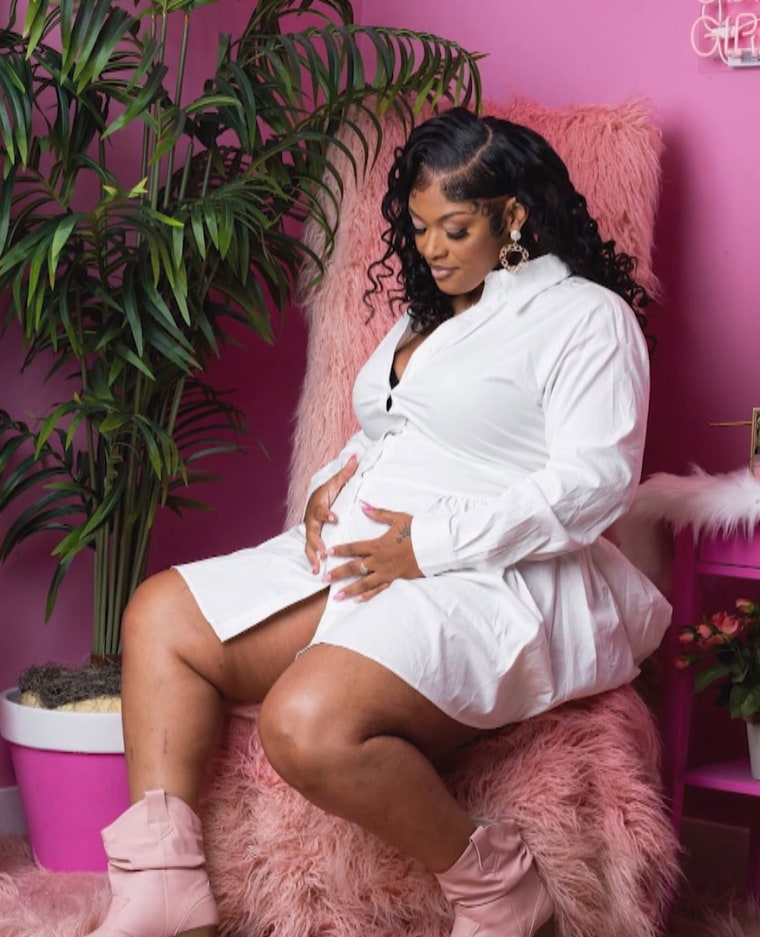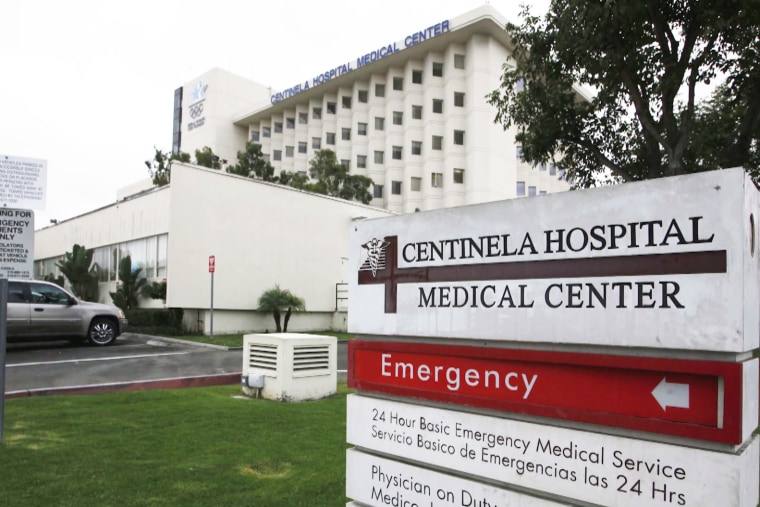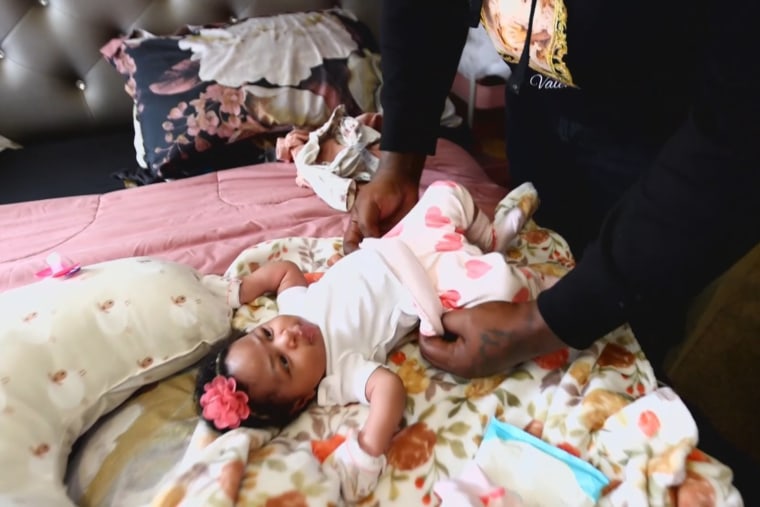INGLEWOOD, Calif. — April Valentine walked into the maternity ward at Centinela Hospital Medical Center in Inglewood, California, on Jan. 9 and never walked out.
She died the next day during labor. The Los Angeles County Medical Examiner determined she died from a blood clot.
But her family and her partner, Nigha Robertson, claim in a wrongful death lawsuit filed last month in Los Angeles County Superior Court that negligence by the hospital and staff contributed to the death of the healthy 31-year-old woman.
“I wouldn’t take my dog to that hospital,” Robertson said in an interview after the lawsuit was filed on Aug. 29.
Her family also fileda complaint in February with the Los Angeles County Board of Supervisors, alleging “systemic and racist practices” at the hospital. The complaint prompted board members to call for a state inspection, which the California Department of Public Health conducted earlier this year.
In a statement to NBC News, Centinela Hospital Medical Center denied the allegations contained in the lawsuit, saying it is “dedicated to delivering compassionate, quality care to all patients.”
It also denied the allegation of systemic racism and said its health care team “reflects the varied ethnic and racial makeup of the community.”
Nevertheless, citing a decreased demand for labor and delivery services, the hospital announced in August that it would close its maternity ward Oct. 25.
Valentine takes steps to avoid becoming a statistic
As Valentine’s excitement over her first pregnancy grew, she also was keenly aware of the risks associated with giving birth as a Black woman, Robertson said.
Black women in the U.S. are nearly three times more likely to die from a pregnancy-related cause than white women, according to a 2021 report from the Centers for Disease Control and Prevention. It said implicit bias and differences in the quality of health care can play a role and found that more than 80% of pregnancy-related deaths in the U.S. were preventable.

Given the statistics, Valentine worked with a birthing doula, a person trained to provide emotional, physical and educational support for an expectant mother or one who has recently given birth. Valentine also sought out a Black physician, Robertson said, and she hung a large whiteboard in her bedroom covered with affirmations and aspirations that she recited daily.
Both Robertson and Valentine’s sister, Kesiah Cordova, were at the maternity ward when she went into labor, and Robertson said he was surprised by the conditions.
“It just felt like a prison,” he said. “It was cold. It was raining that day, so the windows was shaking. They had to put towels by the windows to stop the leaking.”
Robertson alleges in the lawsuit that Valentine’s obstetrician, Dr. Gwen Allen, did not arrive for hours, despite multiple requests to the nurses.
“They say, ‘Well, we can’t call the doctor, the doctor will cuss us out,’” Robertson said in an interview, referring to the nurses’ response.
The allegation about the nurses not calling the doctor was included in the lawsuit, and Cordova said she witnessed the exchange.
Allen’s attorney, Ludlow B. Creary II, said last month that “Dr. Allen did not cause Ms. Valentine’s death,” and federal privacy laws prevented her from commenting further.
Her legs begin to swell during labor
Valentine was feeling contractions, but the nurses were inattentive and refused to give her water, Robertson said. Valentine’s doula, Stanis Askew, was not allowed to be present during delivery, the lawsuit says, despite previous assurances from medical staff that Askew could be on site when delivery began.
Instead, Askew texted with Valentine throughout her labor.
The lawsuit also claims an epidural was poorly administered.
“It took [the medical staff] like 15 minutes to even put the epidural, and she stuck April like six different times,” Robertson said in an interview.
Valentine’s legs began to swell, according to Robertson. Soon after, the lawsuit says, Valentine’s condition worsened. She vomited and eventually stopped breathing.
“Her body just immediately locked up, and her eyes rolled to the back of the head,” Robertson said. “I ran in the hallway. And I was like, ‘Help. She’s not breathing. Help, help, help. She’s not breathing. Help me.’”
Robertson said he began administering CPR himself. Minutes later, doctors took over, according to the state health department inspection.
Valentine did not survive.
Her baby girl, Aniya Heavenly-April Robertson, was delivered in an emergency cesarean section, unresponsive but alive.
In its review of Valentine’s case, the state health department found the hospital “failed to prevent the deficiencies” that caused or are likely to cause someone to get seriously hurt or die.
The agency fined the hospital $75,000 earlier this year, citing a maternal death without naming the patient.
Following a public information request, NBC News obtained state inspection documents for Centinela hospital from 2019 to 2022. The agency found that staff failed to notify families about major changes in patients’ conditions, “rodent activity” from a broken door that was later fixed, and a patient who died after receiving improper medical care.

The documents indicate the hospital developed plans for corrective action, including offering staff counseling, conducting random cleanliness tests and suspending and later terminating an employee.
California’s maternal death rate is among the lowest in the country, with 18.6 maternal deaths for every 100,000 live births in 2020. But from 2018 to 2020, the maternal death rate for Black women was more than three times higher than for white women.
Family fights to prevent maternal deaths
As Aniya nears nine months old, family and friends say they are determined to not let Valentine’s story be forgotten. They gathered outside the hospital in February to share memories and protest her death and started a #Justice4April page online.
“We were just really looking forward to going through motherhood together and, you know, like having play dates,” said Cheyenne Neshay, one of Valentine’s friends. “All of that was taken away from us.”
Robertson said he wants to make sure what happened to Valentine does not happen to anyone else.

“You got to think how many Aprils was out there before this and how many Aprils can be out there after this,” he said. “I’m gonna fight for her and every other Black woman that ever had to do something like this.”






